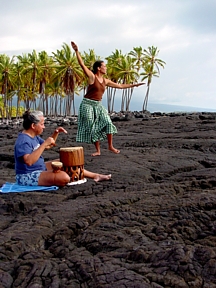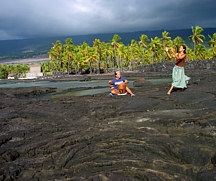Digital Collections
Celebrating the breadth and depth of Hawaiian knowledge. Amplifying Pacific voices of resiliency and hope. Recording the wisdom of past and present to help shape our future.
Kīhei de Silva
Haku mele: Kīhei de Silva (words, 11-88). Moe Keale (music, 2-96).
Discography: Moe Keale, Imagine, Pā‘ani PRD 1005
Hālāwai akula ka mana‘o me ‘oe
I ka hoehoene a ke kai
He kaiolohia, he kai hi‘ilei
Aia i hi‘ikua, i hi‘ialo
E aloha mai ia‘u e Hōnaunau
Ke nā‘ū nā‘ū lā kamali‘i.
He ali‘i ka la‘i, he haku ke aloha
‘O ‘imi o nalowale a loa‘a.
My thoughts have gone to meet you
In the soft singing of the sea
It is a tranquil sea, a lei-bearing sea
Where one is borne on the back, borne in the arms
Look on me kindly, O Honaunau
Where children chant nā‘ū to the sun
Where peace is chief, where love is lord
Where that which was lost is now found.
I wrote this song for my mother, Lorna Pi‘ilani Pratt de Silva, on Thanksgiving Day 1988 at Pōhaku o Ka‘ū, the point of land adjacent to the boat ramp at Hōnaunau, Kona, Hawai‘i. The song was inspired by my re-reading there of Mary Kawena Pukui’s The Polynesian Family System in Ka‘ū, Hawai‘i, especially those sections concerned with parent-child relationships characterized by "the constancy of devotion . . . from infancy to old age (169)." The song’s title is a proverb that Pukui explains in the following manner: "When one is gone to a far place where he cannot be seen by those who love him, he is said to be in hi‘ikua (borne at the back), and when one is where he can be seen daily, he is in hi‘ialo (borne in the presence)." My mother died in early 1987; shortly afterwards, we scattered her ashes in the Hōnaunau cove that fronts her old Kekuewa family home—the home in which she was raised. When my family and I visit her there each Thanksgiving, she is both hi‘ikua and hi‘ialo.
As a haku mele, I am much more a collector and arranger of "flowers" in wreathes of words than I am a creator of that which, to paraphrase Star Trek’s Captain Kirk, "no man has said before." My flowers, as the notes below are meant to demonstrate, only occasionally qualify as original or exotic; more often than not, they are the familiar, time-honored expressions of our people. To the novelty-seeker’s ear, Hawaiian poetry of this sort is thus little more than a boring succession of plagiarized clichés. To the traditional Hawaiian ear, however, the appeal of a song frequently lies in its ability to echo the beauty and wisdom of the past and to draw both into the present. The old songs and sayings, then, are the true composers of my mele; if my work is flawed, the blame should rest with my own weak ears and inept fingers.
Verse 1: "Hālāwai akula ka mana‘o me ‘oe" echoes the line "Hālāwai akula [ka pule kāhea] me Pele – My prayer has gone to meet Pele" in a Pukui-transcribed prayer chant belonging to ancient Ka‘ū. As explained by Pukui, this prayer was addressed to her ancestors in times of "crisis or festivity" (Polynesian Family System, 140); my own line expresses a desire to think about my mother at a time of festivity and remembrance.
Verse 2: Pukui explains "Aia i hi‘ikua, i hi‘ialo" in both her Polynesian Family System (169, as given above) and ‘Ōlelo No‘eau. The latter explanation, which sheds additional light on the saying and song, is provided below:
Aia i Hi‘ikua; i Hi‘ialo.
Is borne on the back; is borne in the arms.
When one has gone to a far place where he cannot be seen by loved ones, he is said to be in Hi‘ikua; and when one is where he can be seen daily, he is said to be in Hi‘ialo. Also said of a favorite child, who is carried in the arms or on the back. Also said of the ‘aumakua. [#56.]
Verse 3: "Ke nā‘ū nā‘ū lā kamali‘i" echoes the second and third verses of the Kamehameha II mele inoa "‘O Kona Kai ‘Ōpua I Ka La‘i":
Hiolo nā wai a ke Kēhau
Ke nā‘ū lā nā kamali‘i
Ke kāohi lā i ke kūkuna lā
Ku‘u lā koili i ka ‘ili kai.
The waters of the Kēhau mist fall
The children are chanting "nā‘ū"
Holding back the rays of the sun
My sun resting on the surface of the sea
The chanting game of nā‘ū, as explained in my notes to "He Inoa No Pi‘ilani" (the next song in this collection), was taught to me by my mother; it is used here as a metaphor of my childhood memories and of my adult efforts to keep the sun of those memories from setting.
Verse 4: The line "He ali‘i ka la‘i, he haku ke aloha" contributes, I hope, to the compounding of images of thought, security, innocence, tranquility, and love by which my song arrives at its final affirmation of my mother’s continued presence at Hōnaunau. The line itself differs only slightly from the proverb for peace that Pukui records as ‘Ōlelo No‘eau #532:
He ali‘i ka la‘i, he haku na ke aloha.
Peace is a chief, the lord of love.
Where peace is, there love abides also.
The song’s final line, "‘O ‘imi o nalowale a loa‘a," is a slight variation of a line from the marriage chant "‘E‘ele Mimo Ka Lani" recorded in Polynesian Family System, 111: "O ‘imi‘imi o nalowale a loa‘a / Loa‘a ho‘i ka hoa e." Pukui’s translation: "There was a seeking of the lost, now it is found / A mate is found." My song, of course, is not about finding a mate; it is about re-finding a mother.
The essay above was written by Kīhei de Silva and published in his book He Aloha Moku o Keawe: A Collection of Songs for Hawai‘i, Island of Keawe, Honolulu, 1997, pps. 31–32. It is offered here, in slightly revised and updated form, with his express consent. He retains all rights to this essay; no part of it may be used or reproduced without his written permission.

photo credit: Kīhei de Silva
‘O ke ko‘iaweawe, ‘O ke ko‘i‘ula ‘O ka ho‘okū ‘O ka moe ‘O ka pao Kū ka pao a ka lani i kāle‘a ai ‘O Kaiki‘ale‘a i ‘Akahipapa. The column of light rain The red-hued cloud The post The beam The vault Here stands the vault in which the chiefs honored the ancestors Kaiki‘ale‘a at ‘Akahipapa.

photo credit: Kīhei de Silva